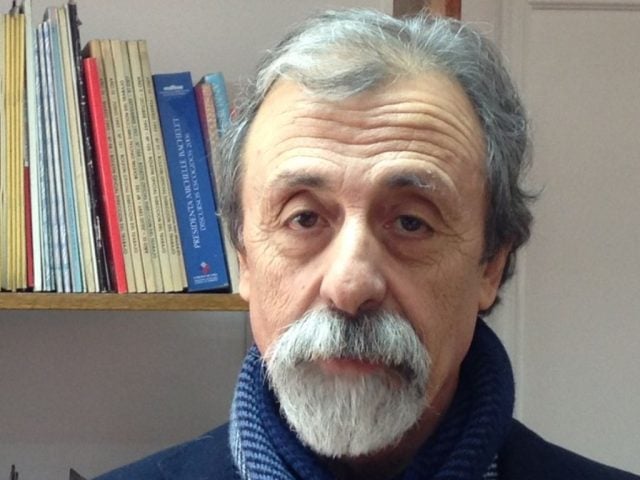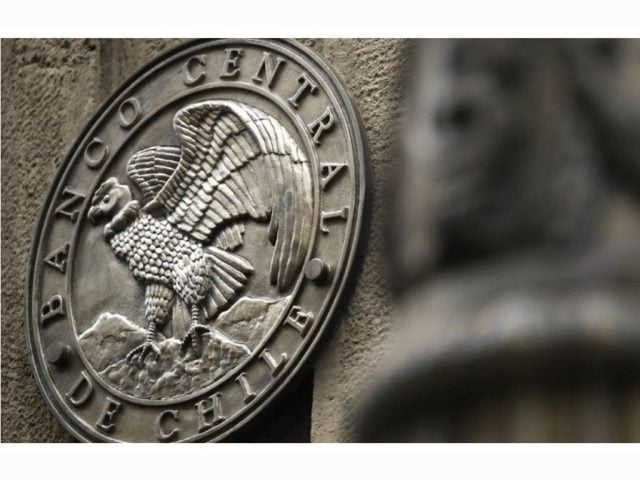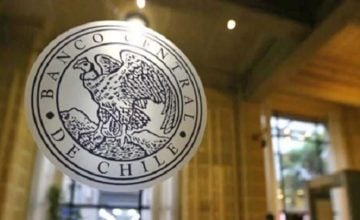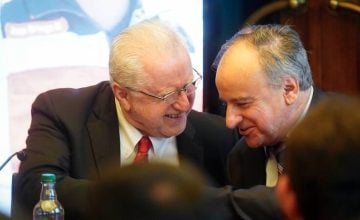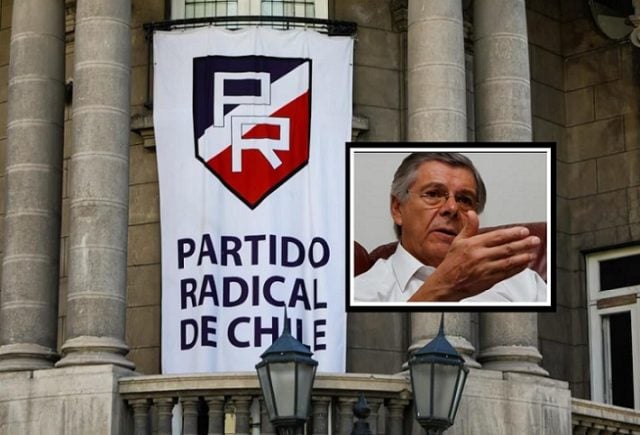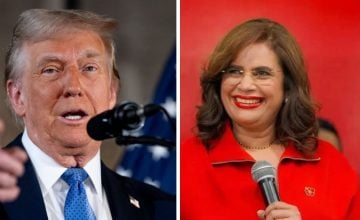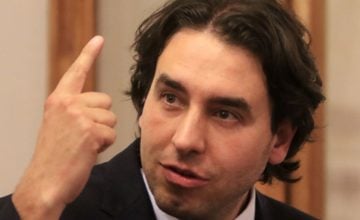With just weeks to go before Chile’s presidential and legislative elections, the Banco Central de Chile (Central Bank of Chile) is at the center of a public dispute over its latest Monetary Policy Report (IPoM) and remarks by its president, Rossana Costa, at a seminar organized by Icare, where she attributed the slowdown in employment to the 40-hour workweek law and the recent increase in the minimum wage.
In a conversation with La Mañanera, Luis Mesina, Secretary General of the Confederation of Banking and Financial Sector Unions, on Tuesday accused the institution of serious “overreach,” politicizing its role and acting in favor of the financial elite.
“In the Monetary Policy Report that Central Bank president Rossana Costa presented at an Icare event, she exceeded the powers that the Central Bank itself grants its board members,” he said on the program hosted by El Ciudadano’s director, Javier Pinera Olcay.
“We must not forget—and this has always concerned us—that, unfortunately, the Central Bank’s role in the economy has been captured by the financial elite. This institution is decisive for men and women across the country, yet it feels distant because its authority has been regulated in the State’s Political Constitution since 1980 and only began to operate, quote-unquote, autonomously in 1989. Therefore, quote-unquote, I reiterate, it supposedly has no dependence on politics, on politicians, or on the State’s political institutions,” said the history professor.
As in a recent public statement by the Confederation of Banking and Financial System Unions, Mesina argued that, with scant analytical rigor and amid an electoral context, the Central Bank set aside its autonomy to enter the political fray—crossing a red line.
“In the Monetary Policy Report presented by the president, she overreached to the point of asserting—without rigor—that the recessionary crisis (not in those exact words, but clearly implied) was largely due to two causes: first, the 40-hour workweek, and second, the increase in the minimum wage,” he recalled.
“That is frankly astonishing, because you don’t need to be a specialist to see that the 40-hour reform has only been in effect for a year—moving from 45 to 44 hours in its first stage—and its impact has been marginal, to be clear. And the increase in the minimum wage—something we point out in our statement—was cited by the Central Bank, particularly its president, in reference to the last three years, which we consider extremely serious,” he said.
According to Mesina, who is also a national spokesperson for the NO+AFP Workers’ Coordinating Committee, Costa’s remarks at the seminar “Economic Outlook and Perspectives, IPoM September 2025,” organized by Icare, show that the Central Bank president “stepped into the political arena during an election process to favor the sector that placed her at the Central Bank—the UDI, the country’s right wing.”
“We are not absolving the four board members—the Council as an institution—of responsibility. But this blatantly reveals that Chile’s Central Bank lacks real autonomy and has also been—this we can discuss—incapable, absolutely incompetent, at carrying out the policy it is mandated to implement,” he emphasized.
An autonomy “in quotation marks”
One of Mesina’s core criticisms targets the very concept of Central Bank autonomy, enshrined in the 1980 Constitution and operational since 1989.
Asked what the ideologues behind the dictatorship and the 1980 Constitution sought to prevent in order to guarantee this supposed autonomy from political power, the professor replied that it was not something that emerged “overnight,” but rather part of the offensive of monetarist ideas that captured many states after the 1980s—particularly those promoted by the so‑called “Chicago Boys.”
“This monetarist policy was obsessed with controlling spending—particularly the monetary value of money—so inflation became its fixation: keeping it from spiraling. They offer lengthy arguments about the consequences of inflationary processes. No one wants inflation, of course, in our countries or anywhere. But that obsession led them to claim that central banks must be run by experts—supposedly apolitical, neutral, and immune to electoral pressures—who would manage monetary policy. The catch is that this ‘autonomy’ had a counterpart: selecting people functional to the model and opposed to any alternative to the economic order in democratic countries,” Mesina argued.
He said this approach imposed a regime that served the interests of the financial elites who control the planet.
He highlighted the experience of countries that resisted this autonomy but faced severe consequences. He cited former Italian prime minister Silvio Berlusconi, who “tried to raise his voice and ended up ousted because he opposed promoting an Italian adviser—favored by the elite—to a post at the European Central Bank.”
“The European Central Bank, which has pushed some of the most regressive policies for workers in Europe, is practically untouchable. Yet central banks around the world are facing political headwinds. The most dramatic case, and I think it’s relevant, is what is happening in the United States with the Federal Reserve (Fed). Recently, President Donald Trump literally pushed out one of its governors, Lisa Cook, and now he has launched an offensive against the Central Bank—the Fed—that sets monetary policy just like Chile’s Central Bank, upending the table. Monetarist economists are enraged, warning that independence is seriously threatened and that political control over central banks, in light of Trump’s actions, is a danger to the world economy and to democracy,” he argued.
However, he recalled that these supposedly apolitical experts “failed—for example, in 2008—when they did not foresee the financial crisis whose consequences we are still paying for today in jobs, wages, and more.”
“That was our critique from the Confederation of Banking Unions—longstanding, not just now, before and during the constitutional process. We have said it is absolutely necessary for our country to address the responsibility borne by an institution tasked with controlling monetary policy, but also exchange-rate policy,” he said.
The Secretary General of the Confederation of Banking and Financial Sector Unions explained that the Central Bank’s role has a direct impact on workers’ wages because it determines the value of money.
“People sometimes find this hard to grasp. Money has a value; it costs something, just as bread has a value, a price. Who sets that, and through what instrument?” he asked.
He noted that the Central Bank sets the interest rate and when it is high—as the institution has kept it in Chile—“what happens is that the price of money becomes very expensive for those who need that commodity called money.”
“Then you get what we see with mortgages—people can’t buy homes; the cost of consumer credit for basic goods also rises. As a result, recessionary dynamics take hold, precisely because of the Central Bank’s decisions,” he added.
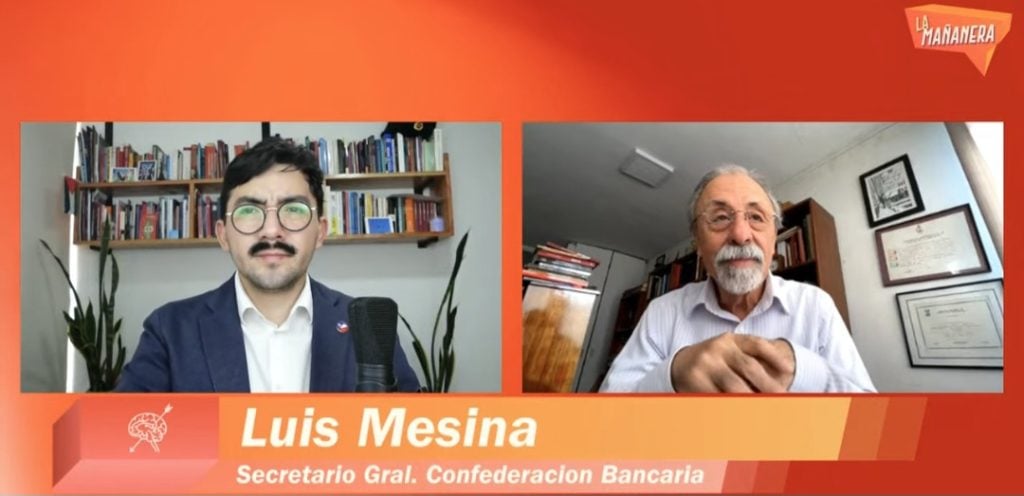
The ideological “dogma” behind interest rates
Asked why the Central Bank maintains high interest rates that raise the price of money, Mesina rejected the notion that it is a purely technical decision and attributed it to an ideological “dogma.”
“Why this obsession with keeping interest rates high—Chile has been among the countries with the highest? Because the dogma is far more present among the so‑called Central Bank ‘officials’,” he said.
“While these board members are autonomous, they are also subject to a degree of oversight by the Comptroller General’s Office regarding the use of public resources, and they have a subtle dependency on the Financial Market Commission when it comes to supervising private banking. In that sense, they respond to ideological imperatives. From their comfortable environments, these economists design almost mathematical models of a supposed economy—but ones totally detached from reality. And the result of this dogma, born of ideology, ultimately undermines the country’s prospects for development,” he argued.
From growth to inequality
Luis Mesina drew a crucial distinction between what, in his view, the Central Bank promotes and what the country actually needs.
“Here in our country, we don’t talk about development; we talk constantly about growth. Growth for what—and for whom?” he said.
To support his point, he used data cited by the head of the issuing authority herself.
“Chile is one of the countries with the most regressive distribution of income in the Americas—not just Latin America. Wealth concentration in our country exceeds that of the United States, Mexico, and Brazil. Those are the results of a policy that hides deep inequality,” he argued.
“That is why we felt it appropriate to stake out a position from the world of work. It is extremely serious that the left—supposedly representing workers’ interests—and the political parties have been silent. And we must say this with great responsibility: neither the Socialist Party nor the Communist Party has spoken out, for two reasons. First, there is a great deal of ignorance among these politicians; second, those who do understand are captured—prisoners of the model—and face serious conflicts of interest.
“So the monetary policy that affects ordinary men and women is represented by no one. That is why we issued this declaración to make some noise and get people thinking. In Chile we need a deep debate about the kind of institution we require to lead monetary policy—one that serves a comprehensive development proposal, generates jobs and better jobs, and respects ecosystems and the environment. This is not just a slogan; these ideas emerged six years ago during the uprising, and yet everything seems to have been forgotten. We are in October, weeks away from commemorating a landmark event, and it is crucial that the world of work put these issues at the center of the debate, especially in an election year,” Mesina concluded.
In Tuesday’s October 7 edition of La Mañanera, our director also spoke with international analyst Pablo Jofré Leal to discuss the genocide in Gaza.
You can watch the full program below:
